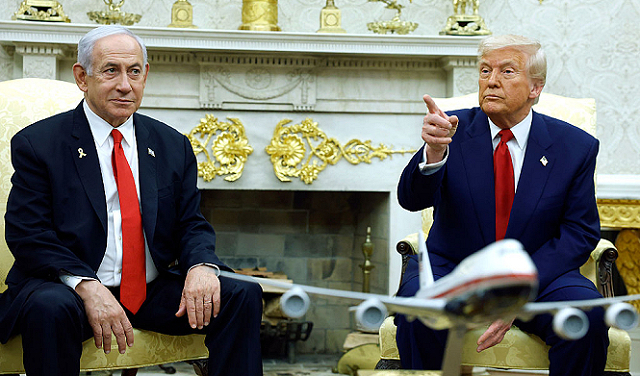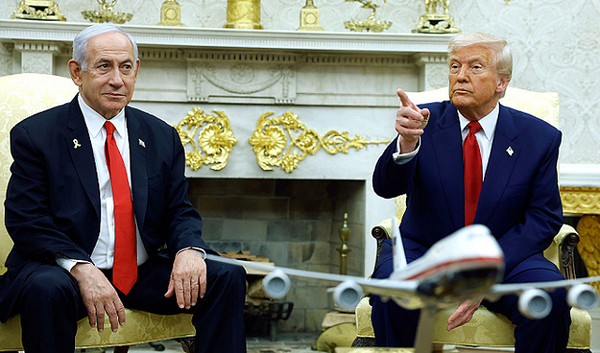Trump disappointed Israel: Will Netanyahu sit idly by? Israel continues to commit crimes in the Gaza Strip daily, killing dozens of Palestinian civilians, starving the population, and destroying buildings that have not yet been destroyed. On Wednesday, 99 Palestinians were killed by Israeli bombardment, bringing the death toll to more than 2,650, with nearly 7,000 wounded, since Israel violated the ceasefire and resumed the war on March 18.
Israel claims that the resumption of the war aims to exert military pressure on Hamas to agree to a prisoner exchange deal, and rejects Hamas's demands for a ceasefire and an Israeli military withdrawal from the Gaza Strip. In other words, Israel is demanding a deal on its own terms, because an end to the 19-month-old war and the withdrawal of its army would mean the fall of Benjamin Netanyahu's government.
Israel has announced that it is preparing for a significant escalation of the war following the conclusion of US President Donald Trump's tour of the region, which did not include a visit to Israel. Earlier this week, the political-security cabinet approved plans for escalation, under the pretext of recovering the 59 Israeli prisoners still held in the Gaza Strip.
Reports have circulated in Israel about a "disagreement" between the army's position and that of Netanyahu and his government. The army believes the primary goal of the war is to return the captives, followed by eliminating Hamas and its military and political capabilities. Netanyahu and his government believe the opposite: to eliminate Hamas first, followed by returning the captives. However, the outcome of these two positions is not contradictory, as neither side agrees to a ceasefire and a withdrawal from the Gaza Strip.
Israeli Chief of Staff Eyal Zamir said during a meeting with division and brigade commanders on Wednesday that in the first phase following the resumption of the war, "Hamas' position remains one of rejection (of a deal). Hamas is responsible for the suffering, the killing, and the destruction. Now is the time to move to the second phase. We will expand and intensify our operations."
In addition to the contradiction between returning the prisoners and eliminating Hamas, and Israel's inability to achieve both since the start of the war, on October 7, 2023, the Israeli army is facing a crisis within its ranks, represented by the refusal of many soldiers in the reserve forces to comply with military service after being sent summons orders, and the continued refusal of the ultra-Orthodox to be conscripted into the army. This threatens a crisis within the Israeli government as well, represented primarily by the abstention of the ultra-Orthodox parties from voting on legislation initiated by the government, which is forced to withdraw it from the Knesset's agenda.
Betting on "True Friend" Trump
Israelis, particularly on the right, describe Trump as a "true friend." However, this description has begun to shake following the US president's decisions over the past two months, which surprised Israelis without prior knowledge. These decisions relate to direct talks with Hamas to free Israeli prisoners who also hold US citizenship, direct negotiations with Iran regarding a new nuclear agreement, and finally, Trump's announcement of a ceasefire with the Houthis that does not prevent their attacks on Israel.
Israelis are disappointed in their "true friend" following these decisions, which they consider to have been made "behind their backs." Although Trump consistently declares his political and military support for Israel, and has even floated the idea of deporting Palestinians from Gaza—a dream of the fascist Israeli right, which gained widespread support in Israel after Trump announced this transfer plan—a "true friend" for Israel is essentially one who supports its war crimes and ignores his own and his country's interests.
Regardless of whether Trump implements his decisions that surprised Israel—he is considered an unpredictable person and can change his mind quickly—the mere fact of making these decisions has clear implications: a crisis and lack of trust exists between Trump and Netanyahu, not between the two countries.
Netanyahu did not dare comment directly on any of these decisions, fearing a reaction from Trump, who does not hesitate to attack or rebuke any world leader in front of the media cameras.
Trump appears to be joining Western leaders expressing positions critical of Israel for its ongoing wars and destabilizing the region. It was clear to the Americans that their strikes against the Houthis in Yemen would not affect the continued attacks on their ships and the disruption of their trade. Therefore, a ceasefire with the Houthis was in both American and Western interests, even though the Houthis declare they will not cease attacks on Israeli ships or Israel itself.
One striking feature of Israel's regional battlefields is that Arabs, from the Atlantic Ocean to the Gulf, view a missile that penetrates Israeli air defenses and falls in Israel—such as the Houthi missile that fell on Ben Gurion International Airport near Tel Aviv—as a major achievement. Israel, on the other hand, views it as a failure that resulted in the targeting of one of its national symbols.
In contrast, Israel describes its extensive raids in Gaza, Lebanon, Syria, Yemen, and Iran, which have killed tens of thousands, mostly civilians, and destroyed numerous facilities, as "achievements." Israel considers the genocide and starvation in Gaza an "achievement."
nuclear negotiations
Israel hopes that the negotiations between the United States and Iran over the latter's nuclear program will fail, and that such a failure will lead to an Israeli-American attack on and destruction of Iranian nuclear facilities. It believes this is the optimal solution to the Iranian nuclear issue, and that through it, it will be possible to overthrow the Iranian regime and dismantle the Iranian axis in the region.
Netanyahu has sought to destroy the nuclear program through a military attack since he became prime minister nearly thirty years ago. He ordered such an attack early last decade, but the move was thwarted by Israeli security chiefs at the time, who rejected a unilateral Israeli attack without American participation.
When the world powers reached the nuclear agreement with Iran in 2015, Netanyahu attacked the agreement and delivered a speech to Congress against then-US President Barack Obama. However, he did not succeed in preventing the signing of the agreement. However, he succeeded in convincing Trump, during his previous presidential term, to withdraw from the nuclear agreement in 2018. However, the US withdrawal from the agreement pushed Iran to develop its nuclear program more than it had before the 2015 agreement, and uranium was enriched to a level that exceeded
It is now close to developing a nuclear bomb, and Iran is now described as a "nuclear threshold" state.
Netanyahu's hopes of possibly attacking Iran's nuclear program were boosted after Trump's second term. However, Trump urgently invited him to the White House in early April to announce to him and the media that the United States would conduct direct negotiations with Iran over its nuclear program.
Netanyahu, sitting next to Trump, looked as if he had been slapped in the face.
The US president addressed him with this announcement. The United States is conducting direct negotiations with Iran, unlike the negotiations that preceded the 2015 agreement, when major powers negotiated with Iran and the United States did not participate directly.
Israeli experts and analysts do not rule out the possibility that the US-Iranian negotiations will end with a nuclear agreement similar to the 2015 agreement, especially since the possibility of Iranian concessions is limited. Experts and researchers recommend that Netanyahu refrain from publicly intervening in the negotiations, as the resulting damage would outweigh the benefits. They also recommend that Israel can influence some aspects of the agreement through secret talks with the Trump administration. Trump's goal is to ensure that Iran does not acquire a nuclear weapon.
It is currently unclear whether a new nuclear agreement will be reached, but if it does, Netanyahu's hopes will be dashed. Israel will be unable to attack the nuclear facilities of a country with which the United States has concluded a nuclear agreement. Achieving the agreement will not lead to the downfall of the Iranian regime and the dismantling of its alliances in the region. If economic sanctions are lifted on Iran, an oil-exporting country, its allies will also recover economically, and their influence in their countries may once again increase.
Faced with such a scenario, Israel is unlikely to sit idly by. It will not attack Iran while a new nuclear agreement is in place or negotiations are underway, but it may resort to media and political-diplomatic campaigns against the nuclear agreement, and may once again accuse Iran of secretly developing a military nuclear program aimed at destroying Israel. It currently appears that Israel will continue its raids in Lebanon and Yemen, while escalating its war on Gaza.
In this context, Israeli Defense Minister Yisrael Katz threatened in a statement on Wednesday that "the Houthis will receive severe blows from Israel if they continue to launch missiles at us, and the Israeli army is ready for any mission."
He added, "I warn the Iranian leadership, which funds, arms, and uses the terrorist Houthi organization, that the proxy approach is over and the axis of evil has collapsed. You bear direct responsibility. What we did to Hezbollah in Beirut, to Hamas in Gaza, to Assad in Damascus, and to the Houthis in Yemen, we will do to you in Tehran. We will not allow anyone to target Israel, and whoever targets us, we will target them severely."



Share your opinion
Trump Disappointed Israel: Will Netanyahu Sit Idle?